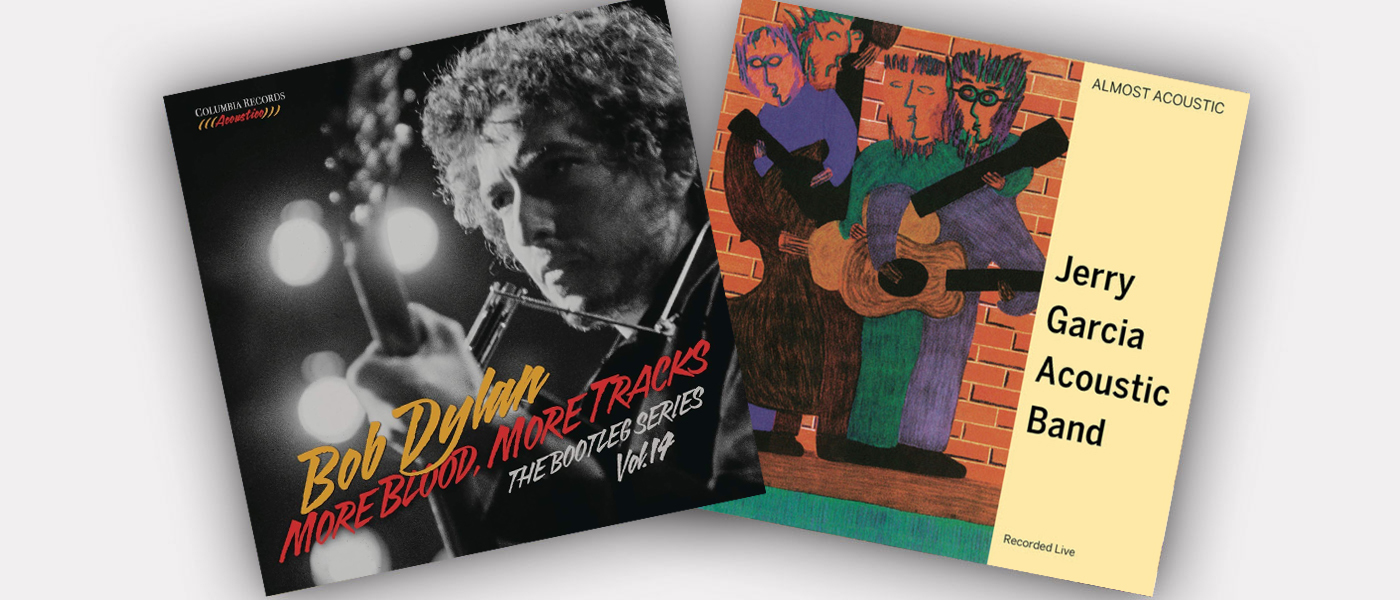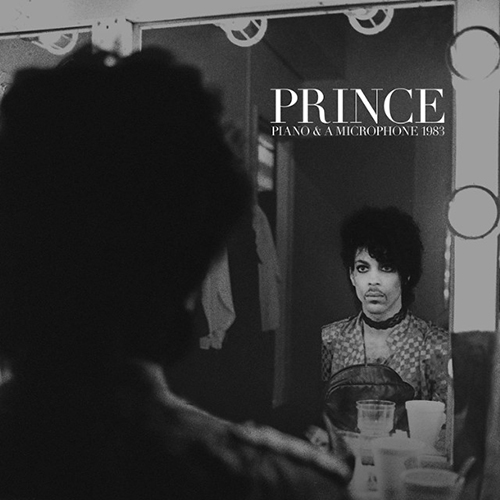
I sold my Iggy Pop ticket a couple of years ago when I was a poor student so that I could afford to see Prince in Oakland on his Piano and a Microphone tour instead. Turned out to be one of his last ten shows and, therefore, one of my best life decisions. The show was at 10 pm on Sunday, February 28, 2016. Piano and a Microphone 1983 was released on September 21, 2018, as Prince’s first ever posthumous release. I’m happy to have it, but I’m not sure he’d be too stoked about it being in my possession.
We’re going to run into this issue for the foreseeable future. We’ll see it with Tom Petty’s estate, and we’ll almost certainly see a slew of releases from Prince’s vault, which is legendarily stocked with untold hours of musical riches. It seems like Prince could barely keep up with himself. In the tradition of James Brown, albums that would have been the finest in most artists’ catalogs were shelved in favor of whatever Prince had stumbled onto in the time between the album’s completion and the time it took to press it. Springsteen could shed some light on that issue too. But he’s alive and very much in control of his narrative. Will Prince’s and Petty’s gatekeepers maintain the artists’ integrity? Or will they acquiesce to the financial spreadsheet makers’ predictions for what will “move the most units?”
The fact that Piano and a Microphone contains a song called “Cold Coffee and Cocaine” might point us towards an answer. Do any of us think that Prince would have been cool with that in 2018? Have any of his fans forgotten his standoff with Warner Bros. in the ‘90s to keep control of his output? Has anyone noticed that Warner Bros. is responsible for this release? I get squirmy just thinking about how mortified he might be. The lyrics contain the word “shit.”
Secrets Sponsor
And who knows what he’d think about the actual performances? I think they’re great, but they’re hell and gone from what I heard during the 2016 Oakland show. He was playing the piano that night. He’s playing with the piano on the 1983 recordings. Better than most players could hope to achieve, but most of us don’t expect greatness from ourselves. Let alone perfection.
The song selection is interesting. The first side is comprised of a long medley, which includes parts of “Purple Rain” and “Strange Relationship,” as well as Joni Mitchell’s “A Case of You” amongst others. He played at least some of all three that night in Oakland. So maybe he’d at least have signed off on that part.
I’m not strong enough to resist a release like this despite the “controversy.” I think it’s fascinating because of the simplistic, low-fi nature of the recordings. There’s a “deluxe” version that comes with a book or something. The standard version includes a high quality all-black inner sleeve that I might transfer over to my official copy of The Black Album. The Prince is dead, and we can do what we want with his work. For better or worse…

My first thought while initially exploring Dirty Computer, Janelle Monae’s newest full-length, was “damn, this sounds like it was recorded at the wrong speed.” It turns out, the vinyl version was cut at 45rpm, but that’s not reflected anywhere on the packaging, so I was at 33 1/3. That’s weird in a bad way. But the album itself is delightfully strange. Which isn’t unexpected from Monae by now. If she were ice cream, she’d be something akin to Ben and Jerry’s Everything but the Kitchen Sink flavor. Except better.
Once I got the speed sorted out, my next impression was that the lead song (and title track) sounded heavily influenced by the Beach Boys. A glance at the tracklist told me that Brian Wilson himself was featured on the tune. This is not at all incongruous. Monae shares Wilson’s gift of melody. Hers dominate the album in the prettiest ways. They outshine any of the raps or the zany instruments. They are the foundation.
My third impression was that I bet Prince would have loved this. Probably more than he would Piano and a Microphone 1983. I’ve since learned via online interviews with Monae that the two were collaborating on Dirty Computer. It sounds like Prince may have written some of the grooves or helped come up with some of the sounds and textures. He may have written “Make Me Feel” in its entirety.
Monae acknowledges Prince’s mentorship in the liners. She apologizes to him in writing for swearing so much, promises to make restitution in the swear jar when next the two meet. I wish he’d lived long enough for the public to witness an extended collaboration between these two. The house would have quaked. There may have been controversy. We’d have all gone delirious, certainly.
Secrets Sponsor
This is the first of Monae’s LPs to veer from the storyline associated with her alter ego, Cindi Mayweather. The album has a theme, but I’m not smart enough to find it. I have ears though, and they hear a lot of cool electronic sounds juxtaposed against plenty of more organic (though still electrified) instruments. It’s like the sonic equivalent of 2001: A Space Odyssey or the original Blade Runner… plenty of special effects and ambient candy, but with clear human interests and talents working beneath. For those who wish to perform a deeper dive, it appears there is a short film affiliated with the album, and Monae provides her inspirations for each song in the liners. She’s working on a deeper level than most of us. Her talent is immense.
These two (45rpm) discs are well pressed with lots of bullish bass and butterfly highs. The stage is deeper than that never-ending hallway in your craziest dreams. If you want the funk, you can find it in the Dirty Computer. Comes with a download code so you can teach all your friends. But this computer was meant to be experienced in the analog domain.
I’ve caught every Drive-By Truckers show that I could reasonably afford time-wise, health-wise, and financially since around the year 2000. Patterson Hood and Mike Cooley are the only members that have survived that band’s entire lifespan, and they’ve been living with each other for longer than that. The liners to the recent release of their first band’s lone album suggest that the ride has often been rough. But sometimes a flower grows through the concrete.
The concrete was called Adam’s House Cat, and they named their flower Town Burned Down. It’s a fascinating glimpse into a partnership that would birth, in the author’s opinion, one of the finest and most important bands of the last two decades. I still think bands can be important. They certainly have been to this band’s two protagonists. It’s nice to share commonalities with your heroes. Especially when they stand in opposition to a common enemy. But that’s a different discussion…
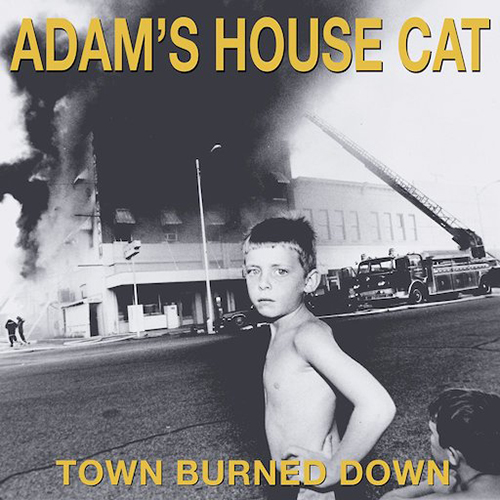
Town Burned Down was recorded in the early ‘90s after the band had practiced for longer and played for fewer people than most anyone else could have tolerated. Maybe that’s how they knew they’d found the real thing. Cooley and Hood couldn’t even walk away after the band’s demise. They had to come back for more punishment. It would have been positively unpoetic if they’d never made it pay.
Town Burned Down is its accomplishment, quite apart from the Truckers’ later successes. It takes a second to mind travel one’s way back to the era that produced it, but you can hear the 1990s shimmering in the acoustic guitar tones, and the snare’s echoing snap. Cooley was clearly on his way to what he would become as a guitarist, although his brilliance as a songwriter remained obscure. Hood’s genius was less conspicuous than it is now, certainly, but it wasn’t invisible either. “Lookout Mountain” sounds forced in comparison to what it would become as a DBT staple. The lyrics don’t fit and flow the way they would later. Or maybe I just can’t un-hear the majesty of the more recent take. “6 O’Clock Train” would have almost fit on the radio next to Soul Asylum’s “Runaway Train.” Or maybe I can’t get past the idea that there’s a more engaging “Runaway Train” on Town Burned Down. Hood addresses this happy accident in the extended liners. The song stands up well alongside latter-day DBT material, and that band has even played it live some over the last few years.
Town Burned Down doesn’t lead with its strongest songs, which kinda cuts against the industry grain – just like the band did. And just like Hood did by going back and re-recording the vocals. From start to finish. (This is not totally without precedent as Springsteen and the Stones have done some recent touch-ups of older recordings that were left on the studio floor.) I’m okay with it. It’s Hood’s work and he (re)did it his way. I’d expect no less.
The pressing is good, not stellar. There’s a download card included and some cool pictures. Hood’s essay in the liners could be a chapter in a larger book one day.
Let us pray…
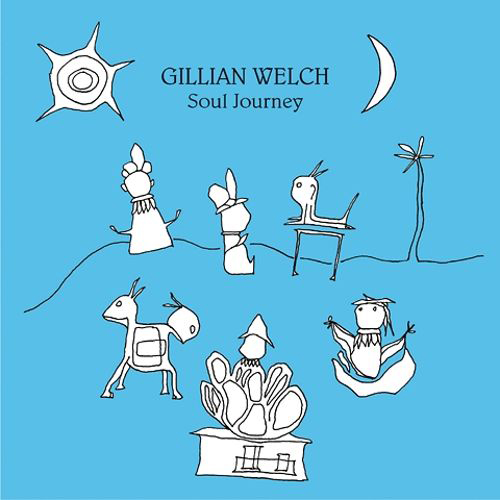
Gillian Welch and David Rawlings are Roots Music Royalty in 2018. I can’t even remember if they were on my radar in 2003 (I don’t remember much about 2003 at all, really), but they should have been. That’s when they unleashed the unfortunately titled Soul Journey. There’s nothing ordinary about it besides the name.
The record’s perfect from a musical perspective. Airy acoustic instruments supplemented by organ accents that are warmer than a wood burning stove in a country cabin. The harmony vocals are so sweet and lonesome you could cry in your moonshine. They’ve got the modern-day Appalachia-inspired songbook cornered. Forget for a second that they’re a couple of Northeastern Yankees. They’re an American sonic treasure.
Rawlings’s guitar playing is as fluid, technical, and melodic as any I’ve heard this century. He mostly lays back on Soul Journey, but his contributions are essential and obvious. His name isn’t on the marquee, but, man, he’s a monster.
Welch’s vocals aren’t explosive, but they’re plenty emotive. Her songwriting is slick and as evocative as an Erskine Caldwell novel. “Look at Miss Ohio” seems to be a fan favorite. It always gets a reaction when played live, and I don’t think I’ve seen her perform when it wasn’t on the setlist. Even when Rawlings’s name was on the marquee and hers was not.
If you like dobroes and fiddles and songwriting chops and vintage acoustic guitars played beneath perfectly harmonious vocals, you’re in the right place. If you don’t like all that, you’re wrong. You do, you just don’t know it yet. Soul Journey will fix that covered wagon for you.
It’s been well documented that the pair bought their lathe to combat their dissatisfaction with the vinyl industry’s inconsistent production methods. Cowboy hats off to them for that. I’m of the opinion that the consumer should have some recourse after finding that they’ve purchased a subpar pressing, but we do not. At best, the process for seeking recompense is tiring. At worst, it’s futile. The sonics on Soul Journey is as pristine as they are on any of the other Acony Records vinyl releases so far. The QRP pressing is less perfect. I wish the duo would use RTI. I wish everyone would.
If this is as good as it gets, it’s good enough for now. But it feels like Welch and Rawlings trained for a 15 round fight and threw in the towel during the 14 the. Right when the knockout was all but assured. You can’t expect perfection in the vinyl realm, but you can sure as hell hope. One of these good ol’ days the pressings will catch up with the mastering…
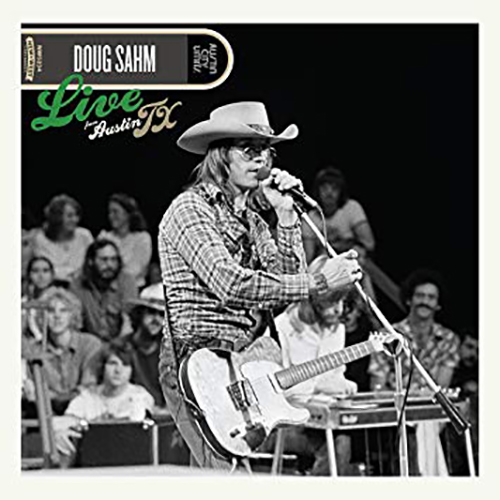
I went on an Uncle Tupelo jag recently in celebration of the 25 anniversary of their Anodyne album. I played it a million times, watched 100 YouTube videos, and read an article in Rolling Stone that detailed how Doug Sahm wound up guesting on that album. The short version is that Jay Farrar was standing in a line somewhere behind Sahm and recognized him by his voice alone. Farrar asked Sahm to sit in on the album that Uncle Tupelo was in the process of recording, and the world was gifted with Farrar’s and Sahm’s duet on the latter’s classic “Give Back the Key to My Heart.” There were also anecdotes about Sahm ’s conspicuous arrival at the recording studio in an outsized car that was dwarfed by his even larger personality. All that personality and Sahm’s inimitable musicianship is on full display throughout his installment in the Live from Austin, TX series.
There’s a great documentary called Sir Doug and the Genuine Texas Cosmic Groove available for streaming that’ll bring you up to speed if you’re uninitiated. Sahm’s is an often untold legend, but he’s one of the true greats from the Classic Era. He coaxed Dylan out of hiding to record on his Doug Sahm and Band album in the early ’70s along with Dr. John. That ’s not anything. The Austin set was recorded in 1975 with Sahm’s right-hand man, Augie Meyers, providing the tasty Vox organ work that made up such a significant portion of the Sir Douglas Quintet’s rocking sound during the preceding decade.
The performances are loose, but far from sloppy. Sahm’s Telecaster bites, his voice soars, and slices soothe and summons. He’s like a conductor in the eye of a Texas hurricane imploring the audience to dance & the players to play. There’s mellow pedal steel beneath it all as the voice of reason. I might be projecting, but Sahm sounds like he might not be the soberest person in the room. It’s a party, baby, like a border town in full celebration.
Some of my favorite Sahm songs and covers including “Papa Ain’t Salty,” “Mendocino,” “She’s About a Mover,” “It’s Gonna Be Easy,” and “At the Crossroads” are represented. Unfortunately, the latter title is marred by what sounds like a non-fill issue on my copy. There’s not a ton of depth to the recordings themselves. It’s probably the least impressive installment of the Live from Austin series that I’ve explored, so far, from a sonic perspective. It’s also the eldest, and there’s almost certainly a correlation there.
Still, it’s a professionally documented live performance by Doug Sahm from the mid- ‘70s. I don’t know of many others. There’s another installment from the same series recorded by Sahm under the Sir Douglas moniker from 1981 that’s also available on vinyl. Not my favorite era for anything, but I have high hopes. We’ll certainly be exploring that one here soon enough. In the meantime, check out that documentary and soak up all the Cosmic Sahm you can. Sir Douglas Quintet’s Mono Singles set by Sundazed would be a fine point of entry.


